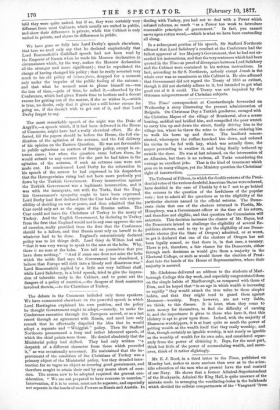The most remarkable speech of the night was the Duke
of Argyll's,—a speech which, if it had been delivered in the House of Commons, might have had a really electrical effect. He de- ferred, till the papers should be before the House, the full vin- dication of the agitation of the autumn, and the full delivery of his opinion on the Eastern Question. He was not favourable to public agitations on matters of foreign policy, except in ex- treme cases ; but when the question came before them, he would submit to any censure for the part he had taken in the agitation of the autumn, if such an extreme ease were not made out. He condemned Lord Derby for the reiteration in his speech of the sorrow he had expressed in his despatches that the Herzegovininn rising had not been more perfectly put down by the Turkish Government. Every insurrection against the Turkish Government was a legitimate insurrection, and it was with the insurgents, not with the Turks, that the Eng- lish Government's sympathy ought to have been expressed. Lord Derby had first declared that the Czar had the sole respon- sibility of deciding on war or peace, and then admitted that the Czar could only act as the organ of the Russian nation. The Czar could not leave the Christians of Turkey to the mercy of Turkey. And the English Government, by declaring to Turkey from the first that England would not in any case approve the use of coercion, really provided from the first that the Conference should be a failure, and that Russia must rely on herself to do whatever had to be done. England's ostentatiously declared policy was to let things drift. Lord Grey de Wilton had said "that it was very wrong to speak to the man at the helm. Why, there is no man at the helm. You tell us yourselves that you have done nothing." "And if some one does not seize the helm which the noble Earl says the Government has abandoned, I believe that Europe will drift into a bloody and disastrous war." Lord Beaconsfield replied by a little not very brilliant chaff, while Lord Salisbury, in a brief speech, tried to give the impres- sion of tolerable unity in the Cabinet, and to point out the dangers of a policy of coercion,—the dangers of fresh massacres involved therein,—to the Christians of Turkey.


































 Previous page
Previous page